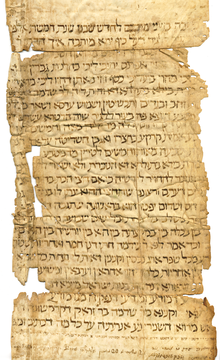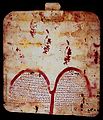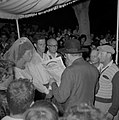Ketouba




La ketouba (de l'araméen ketoubba, « document écrit ») est un contrat de mariage juif.
Censée fixer les obligations y compris monétaires du fiancé vis-à-vis de sa future épouse, elle est constituée des noms des futurs époux, de leurs parents et de leurs témoins. Elle fixe les devoirs de chacun selon la loi juive et attribue une protection particulière pour l'épousée.
Fonction historique
La ketubah remplaçait le mohar biblique - le prix payé par le marié à la mariée ou à ses parents pour le mariage (c'est-à-dire la dot)[1]. La ketubah servait de contrat, par lequel le montant dû à la femme (la dot) devait être payé en cas de cessation du mariage, soit par la mort du mari, soit par le divorce. Le mohar biblique avait créé un problème social majeur : de nombreux jeunes futurs maris ne pouvaient pas réunir le mohar à l'époque où ils auraient normalement dû se marier. Pour permettre à ces jeunes hommes de se marier, les rabbins ont donc retardé la date à laquelle la somme devait être versée[2].
Contenu
Dans la ketubah, le fiancé juif s'engage à fournir à sa femme trois choses essentielles : des vêtements, de la nourriture et des relations conjugales[3], ainsi qu'à lui verser une somme d'argent préétablie en cas de divorce.
Le document est lu à voix haute durant la cérémonie devant l'assemblée, signé par deux témoins juifs et confié à la mariée.
Galerie
-
 Crédit image:Ketubot Collection of the National Library of Israellicence CC BY-SA 3.0 🛈
Crédit image:Ketubot Collection of the National Library of Israellicence CC BY-SA 3.0 🛈 -
Ketouba italienne signée « Abram Elia Fano inventio and fece », v. 1740.
-
Crédit image:licence CC BY-SA 3.0 🛈Ketouba de Niederzissen (Allemagne), 1746.
-
 Crédit image:The Ketubbot collection of the National Library of Israellicence CC BY-SA 3.0 🛈Ketouba du Yémen, 1775.
Crédit image:The Ketubbot collection of the National Library of Israellicence CC BY-SA 3.0 🛈Ketouba du Yémen, 1775. -
 Crédit image:The Ketubbot collection of the National Library of Israellicence CC BY-SA 3.0 🛈Ketouba de Malte, 1807.
Crédit image:The Ketubbot collection of the National Library of Israellicence CC BY-SA 3.0 🛈Ketouba de Malte, 1807. -
Ketouba célébrant le mariage de Mosheh ben Avraham ben David Hasan (Mosheh ben Avraham Hassan) et de Donah bat Avraham ha-Levi ben Shemuel ha-Levi Ben Susan (Dona Bensusan), le 13 Kislev 5587 [], Gibraltar.
-
 Crédit image:The Ketubbot collection of the National Library of Israellicence CC BY-SA 3.0 🛈
Crédit image:The Ketubbot collection of the National Library of Israellicence CC BY-SA 3.0 🛈 -
Ketouba de Londres (Royaume-Uni), 1836.
-
Ketouba de Perse, 1840.
-
 Crédit image:Ketubot Collection of the National Library of Israellicence CC BY-SA 3.0 🛈
Crédit image:Ketubot Collection of the National Library of Israellicence CC BY-SA 3.0 🛈 -
 Crédit image:licence CC BY-SA 4.0 🛈Détail d'une ketouba célébrant le mariage de Benjamin Levy et Esther Solomon à Wellington (Nouvelle Zélande), 1842
Crédit image:licence CC BY-SA 4.0 🛈Détail d'une ketouba célébrant le mariage de Benjamin Levy et Esther Solomon à Wellington (Nouvelle Zélande), 1842 -
Ketouba de 1843.
-
 Crédit image:The Ketubbot collection of the National Library of Israellicence CC BY-SA 3.0 🛈Ketouba de Tunisie, 1854.
Crédit image:The Ketubbot collection of the National Library of Israellicence CC BY-SA 3.0 🛈Ketouba de Tunisie, 1854. -
 Crédit image:The National Library of Israel Ketubbot Collectionlicence CC BY-SA 3.0 🛈Ketouba d'Égypte, 1873.
Crédit image:The National Library of Israel Ketubbot Collectionlicence CC BY-SA 3.0 🛈Ketouba d'Égypte, 1873. -
 Crédit image:The Ketubbot collection of the National Library of Israellicence CC BY-SA 3.0 🛈
Crédit image:The Ketubbot collection of the National Library of Israellicence CC BY-SA 3.0 🛈 -
 Crédit image:The Ketubbot collection of the National Library of Israellicence CC BY-SA 3.0 🛈
Crédit image:The Ketubbot collection of the National Library of Israellicence CC BY-SA 3.0 🛈 -
Ketouba, avant 1911.
-
Ketouba traditionnelle avant 1911.
-
 Crédit image:The Ketubbot collection of the National Library of Israellicence CC BY-SA 3.0 🛈Ketouba de Macédoine, 1919.
Crédit image:The Ketubbot collection of the National Library of Israellicence CC BY-SA 3.0 🛈Ketouba de Macédoine, 1919. -
 Crédit image:licence CC BY-SA 4.0 🛈
Crédit image:licence CC BY-SA 4.0 🛈 -
 Crédit image:The Schwadron collection of the National Library of Israellicence CC BY-SA 3.0 🛈Ketouba d'Alger, 1949.
Crédit image:The Schwadron collection of the National Library of Israellicence CC BY-SA 3.0 🛈Ketouba d'Alger, 1949. -
Mariage au moment de la lecture de la ketouba sous le dais nuptial (houppa) dans le kibboutz Yad Mordechai à Ashkelon (Israël), 1964.
-
 Crédit image:Ketubbot Collection of the National Library of Israellicence CC BY-SA 3.0 🛈Ketubah de Hongrie issue de la collection des Ketubbot de la Bibliothèque nationale d'Israël.
Crédit image:Ketubbot Collection of the National Library of Israellicence CC BY-SA 3.0 🛈Ketubah de Hongrie issue de la collection des Ketubbot de la Bibliothèque nationale d'Israël. -
Ketouba enluminée célébrant le mariage de David Immanuel, fils d'Issac de Pinto et Rachel fille de Jacob de Pinto.
-
 Crédit image:Ketubbot Collection of the National Library of Israellicence CC BY-SA 3.0 🛈Ketouba vierge des États-Unis.
Crédit image:Ketubbot Collection of the National Library of Israellicence CC BY-SA 3.0 🛈Ketouba vierge des États-Unis. -
 Crédit image:Ketubot Collection of the National Library of Israellicence CC BY-SA 3.0 🛈Ketouba vierge de Russie.
Crédit image:Ketubot Collection of the National Library of Israellicence CC BY-SA 3.0 🛈Ketouba vierge de Russie. -
 Crédit image:Ketubbot Collection of the National Library of Israellicence CC BY-SA 3.0 🛈Ketouba vierge d'Uruguay.
Crédit image:Ketubbot Collection of the National Library of Israellicence CC BY-SA 3.0 🛈Ketouba vierge d'Uruguay. -
 Crédit image:Ketubbot Collection of the National Library of Israellicence CC BY-SA 3.0 🛈Ketouba d'Arménie.
Crédit image:Ketubbot Collection of the National Library of Israellicence CC BY-SA 3.0 🛈Ketouba d'Arménie. -
 Crédit image:Ketubot Collection of the National Library of Israellicence CC BY-SA 3.0 🛈Ketouba d'Autriche.
Crédit image:Ketubot Collection of the National Library of Israellicence CC BY-SA 3.0 🛈Ketouba d'Autriche. -
 Crédit image:Ketubot Collection of the National Library of Israellicence CC BY-SA 3.0 🛈Ketouba de Chypre.
Crédit image:Ketubot Collection of the National Library of Israellicence CC BY-SA 3.0 🛈Ketouba de Chypre. -
 Crédit image:Ketubot Collection of the National Library of Israellicence CC BY-SA 3.0 🛈Ketouba de Grèce.
Crédit image:Ketubot Collection of the National Library of Israellicence CC BY-SA 3.0 🛈Ketouba de Grèce. -
 Crédit image:Ketubot Collection of the National Library of Israellicence CC BY-SA 3.0 🛈Ketouba de Cuba.
Crédit image:Ketubot Collection of the National Library of Israellicence CC BY-SA 3.0 🛈Ketouba de Cuba. -
 Crédit image:Ketubot Collection of the National Library of Israellicence CC BY-SA 3.0 🛈Ketouba d'Azerbaijan.
Crédit image:Ketubot Collection of the National Library of Israellicence CC BY-SA 3.0 🛈Ketouba d'Azerbaijan. -
 Crédit image:Ketubot Collection of the National Library of Israellicence CC BY-SA 3.0 🛈Ketouba du Portugal.
Crédit image:Ketubot Collection of the National Library of Israellicence CC BY-SA 3.0 🛈Ketouba du Portugal. -
 Crédit image:Ketubot Collection of the National Library of Israellicence CC BY-SA 3.0 🛈Ketouba d'Inde.
Crédit image:Ketubot Collection of the National Library of Israellicence CC BY-SA 3.0 🛈Ketouba d'Inde. -
 Crédit image:Ketubot Collection of the National Library of Israellicence CC BY-SA 3.0 🛈Ketouba d'Allemagne.
Crédit image:Ketubot Collection of the National Library of Israellicence CC BY-SA 3.0 🛈Ketouba d'Allemagne. -
 Crédit image:Ketubot Collection of the National Library of Israellicence CC BY-SA 3.0 🛈Ketouba de Turquie.
Crédit image:Ketubot Collection of the National Library of Israellicence CC BY-SA 3.0 🛈Ketouba de Turquie. -
 Crédit image:Ketubot Collection of the National Library of Israellicence CC BY-SA 3.0 🛈Ketouba de Belgique.
Crédit image:Ketubot Collection of the National Library of Israellicence CC BY-SA 3.0 🛈Ketouba de Belgique. -
 Crédit image:Ketubot Collection of the National Library of Israellicence CC BY-SA 3.0 🛈Ketouba de Moldavie.
Crédit image:Ketubot Collection of the National Library of Israellicence CC BY-SA 3.0 🛈Ketouba de Moldavie. -
 Crédit image:Ketubot Collection of the National Library of Israellicence CC BY-SA 3.0 🛈Ketouba de France.
Crédit image:Ketubot Collection of the National Library of Israellicence CC BY-SA 3.0 🛈Ketouba de France. -
 Crédit image:Ketubot Collection of the National Library of Israellicence CC BY-SA 3.0 🛈Ketouba d'Ouzbekistan.
Crédit image:Ketubot Collection of the National Library of Israellicence CC BY-SA 3.0 🛈Ketouba d'Ouzbekistan. -
 Crédit image:Ketubot Collection of the National Library of Israellicence CC BY-SA 3.0 🛈Ketouba de Pologne.
Crédit image:Ketubot Collection of the National Library of Israellicence CC BY-SA 3.0 🛈Ketouba de Pologne. -
 Crédit image:Ketubot Collection of the National Library of Israellicence CC BY-SA 3.0 🛈Ketouba d'Iran.
Crédit image:Ketubot Collection of the National Library of Israellicence CC BY-SA 3.0 🛈Ketouba d'Iran. -
 Crédit image:licence CC BY-SA 3.0 🛈Remise ce la ketoubah à la mariée, Israël, 2011
Crédit image:licence CC BY-SA 3.0 🛈Remise ce la ketoubah à la mariée, Israël, 2011
Références
- ↑ (he + en) « Genesis 34:12, Exodus 22:16–17, Deuteronomy 20:7, Deuteronomy 22:29, Hosea 2:19–20 », sur mechon-mamre.org
- ↑ (en + de) Naomi Lubrich, Caspar Battegay, Jewish Switzerland: 50 Objects Tell Their Stories, Christoph Merian, , 231 p. (ISBN 9783856168476), p. 110
- ↑ (en) « Kosher Sex »










![Cliquez sur l'image pour voir les détails concernant l'auteur, la licence et la page d'origine de l'image Ketouba célébrant le mariage de Mosheh ben Avraham ben David Hasan (Mosheh ben Avraham Hassan) et de Donah bat Avraham ha-Levi ben Shemuel ha-Levi Ben Susan (Dona Bensusan), le 13 Kislev 5587 [13 décembre 1826], Gibraltar.](http://upload.wikimedia.org/wikipedia/commons/thumb/e/e9/1826_Ketubah_from_Gibraltar.jpg/83px-1826_Ketubah_from_Gibraltar.jpg)








































